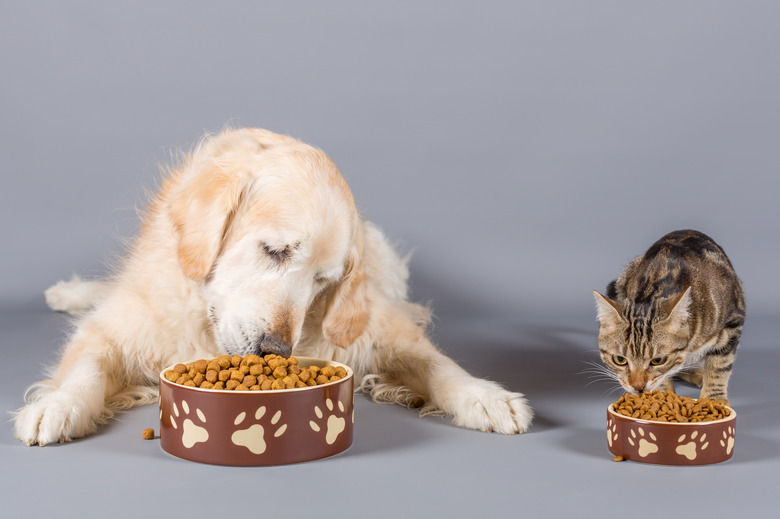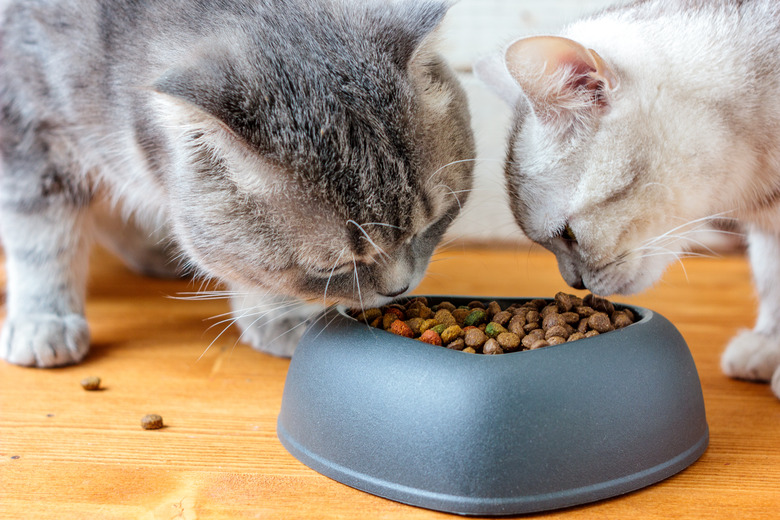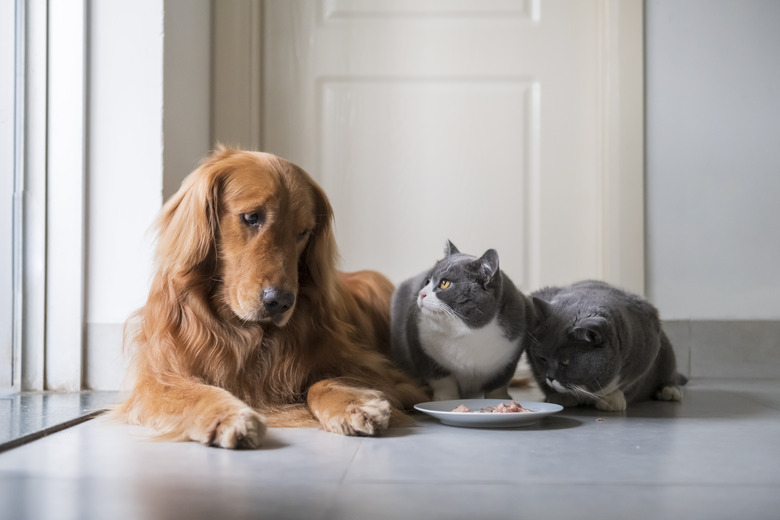What's The Difference Between Dog Food And Cat Food?
If you share your life with both a dog and a cat who get along well, you know how adorable interspecies relationships can be. In fact, dogs and cats are incredibly alike in many ways, and they're often crazy about each other when they live under the same roof. Many don't even mind sharing your love and attention, and along with snuggling and hanging out with you, their favorite things to do are play, sleep, and eat.
But as much as they are alike in so many ways, dogs and cats are actually as different as night and day, and among the things they should never share is their diet.
What's the difference between cat food and dog food?
What's the difference between cat food and dog food?
There's a big difference between dog food and cat food because there's a big difference between dogs and cats. Each requires species-specific nutrition to be optimally healthy.
Both are carnivores, but cats are obligate carnivores or what's known as "true" carnivores, which means they must eat meat to thrive. While cats can eat a variety of foods, including vegetables and grains, these foods are optional, but meat is a necessity in their diet. Cats lack the specific enzymes necessary to use plant proteins as efficiently as animal proteins, explains Dr. Karen Becker of Mercola Healthy Pets, and require animal meat and organs to meet their high protein and nutrient requirements.
Dogs are scavenging or facultative carnivores, which means they are primarily meat-eaters and need to eat meat to thrive, but, if necessary, dogs can survive on plant matter. But there's a huge difference between thriving and just surviving. Consequently, your dog's ideal food should be meat-based, not plant-based, for him to thrive. In that, cats and dogs are much alike, but the similarity ends there as each species has a unique nutrient profile.
If you ever find a product labeled pet food for both cats and dogs, you should steer clear.
Species-specific nutrient profile differences
Species-specific nutrient profile differences
In a nutshell, the main differences between pet food for dogs and cats are as follows:
- Palatability
- Vitamin A leve
- lTaurine
- Arachidonic acid
- Protein level
Palatability
Ever wonder why your dog raids your cat's food dish when he thinks no one is looking, but your cat ignores the dog's food? It's because dogs have a wider range of taste buds than cats making most things pleasant to their taste, including cat food, which is one of the more delicious items dogs will ever eat.
With their more limited range of palatability, cats don't have the same tendency to eat indiscriminate items like dogs do; for example, cats can't taste anything sweet and rarely will a cat owner see a cat dive into a bowl of dog kibble, or chew on a jerky treat, for instance. Thus, pet food manufacturers formulate dog food and cat food with species-specific palatability a top priority.
Vitamin A
Cats must have Vitamin A added to their food because their bodies don't have the ability to make it while dogs' bodies turn beta carotene into Vitamin A. Though Vitamin A is often added to dog food, it's not in the same quantities as that required in cat food.
Cats must have Vitamin A in their food for healthy skin, coat, muscles, and nerves and deficiencies can cause health disorders. Sources of Vitamin A are liver, fish liver oil, and egg yolks. The Association of American Feed Control Officials recommends that adult cat food provide 9,000 IU Vitamin A per 2.2 pounds (1 kilogram) of food.
Taurine
Taurine is an essential amino acid naturally found in meat and dairy products that cats cannot live without. It occurs in the protein in cat food and is also added separately. On the other hand, dogs can make their own taurine so dog foods are deficient in this nutrient that is so vital to cats. If you were to feed a cat a diet of dog food lacking sufficient levels of taurine, it could result in the cat developing heart disease (hypertrophic cardiomyopathy) and blindness.
Arachidonic acid
Dogs build their own arachidonic acid, one of the essential fatty acids, inside their bodies so it is not added to dog food, but is a key nutrient that is added to cat food.
Protein Level
A significant difference between dog food and cat food is the protein level. When comparing bags of commercial dry food, you'll usually find the protein level on the dog food label will be less than the cat food. While some dog foods do have high levels of protein, most don't have the percentage of protein cats require. For example, according to AAFCO standards, a dog's diet should be comprised of between 18 and 22% protein, compared to 26 to 30% for a cat.
Conclusion
Conclusion
Based on the differences in the composition and nutrients in dog food versus cat food and the species-specific nutrient requirements of each, dogs could, in theory, eat a diet of cat food. However, its caloric density, high protein levels, and heavy doses of fat would lead to obesity and health problems. Even though they could technically survive on it, you should not feed dogs cat food.
In contrast, our carnivorous cats could not survive eating a diet of dog food, which for cats is deficient in essential nutrients such as vitamin A, taurine, and arachidonic acid, and does not provide sufficient protein levels. For this reason, cats should not eat dog food. Stick to species-specific food for each of your pets to allow them to thrive.
both dogs and cats,
Always check with your veterinarian before changing your pet's diet, medication, or physical activity routines. This information is not a substitute for a vet's opinion.


